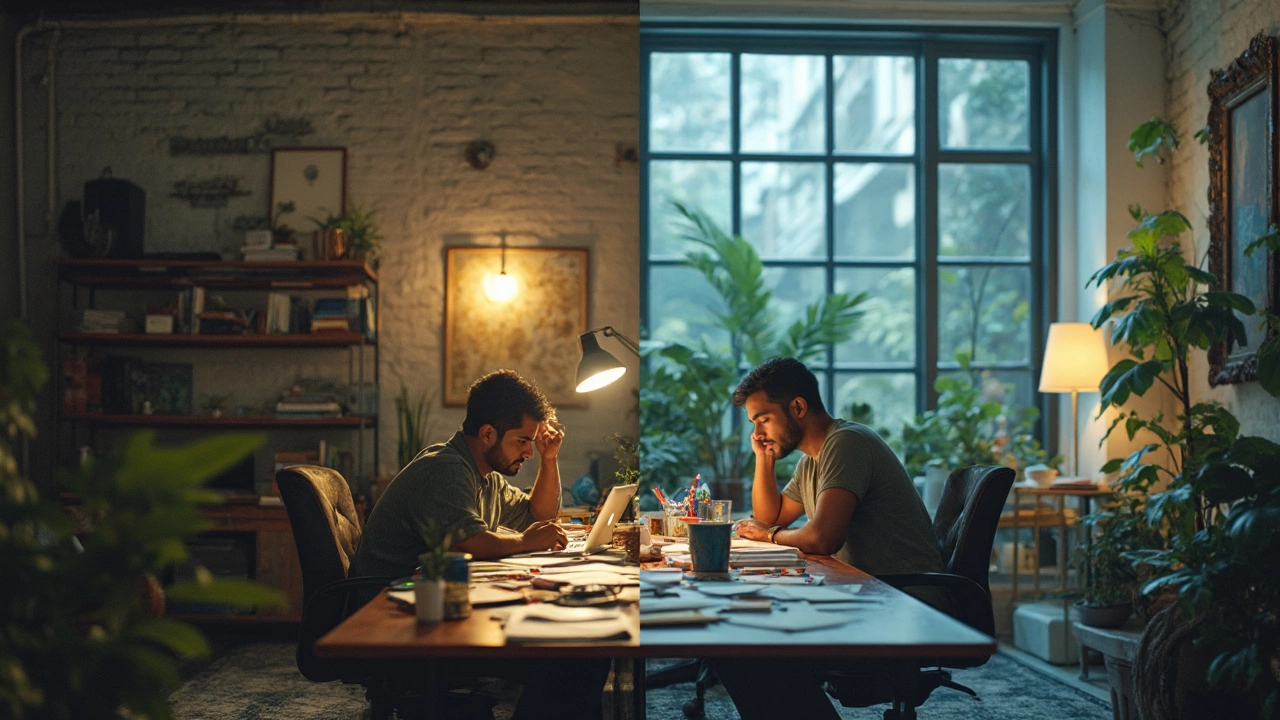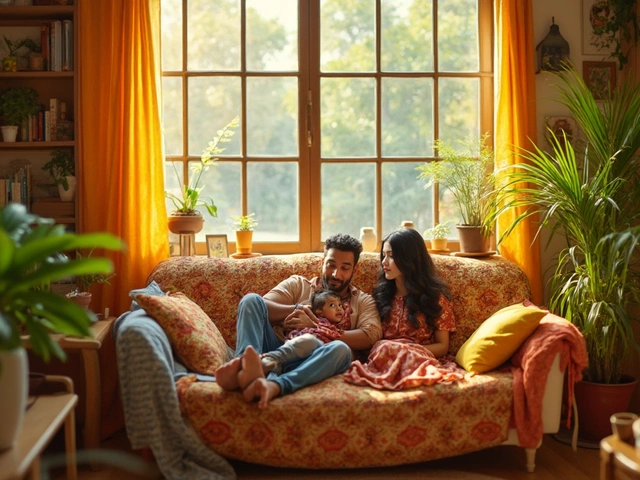Ever walked into a room and instantly felt stressed or, the opposite, surprisingly relaxed? You’re not imagining it—your surroundings really can mess with your head, your energy, and even your ability to focus. We’re not just talking about fancy homes or offices. The basics matter a ton: air quality, light, green spaces, and noise levels can all send your mood and health in totally different directions.
Most people live or work in places they didn’t design themselves. That’s normal. But tiny tweaks, like adding a plant or letting in more daylight, actually change things for the better—science backs that up. Real studies show folks heal faster and think clearer when their environments support them. It’s wild how a cluttered room or a noisy street can make you more anxious, while a bit of order or some greenery can help you chill out and recharge. Today, environmental groups are pushing this message, and there’s plenty you can do without spending a fortune.
- Surroundings and First Impressions
- The Science Behind Environmental Impact
- Nature’s Surprising Benefits
- Noise, Chaos, and Modern Stress
- Clutter versus Calm
- Simple Ways to Upgrade Your Space
Surroundings and First Impressions
Ever notice how you instantly judge a place the second you step in? That’s no accident. Our brains are wired to scan new surroundings and decide if it’s chill or a stress-fest. Turns out, those snap judgments have real effects on our mood, stress, and even how well we get along with people. When it comes to the environment, first impressions stick way more than we realize.
Big companies actually pay experts to design lobbies and open spaces that feel welcoming, hoping to make employees feel at ease and customers want to come back. In one study from Princeton, people formed first impressions of places in less than a second. Yeah, less than one second. That’s how fast our brains make decisions based on lighting, color, smells, and even clutter.
Think about a doctor’s office. Bright lights and clutter can make you tense, while softer lighting and clean lines often help people relax. Apartment listings with tidy, well-lit photos rent out faster too. The same goes for restaurants, stores, or even a friend’s living room—if the vibes are off, you probably won’t want to hang around.
Check out this quick comparison of how certain surroundings hit us:
| Environment Feature | Common Impact |
|---|---|
| Natural Light | Boosts mood, improves alertness |
| Clutter | Raises stress, lowers focus |
| Plants/Greenery | Reduces anxiety, sharpens focus |
| Loud Noise | Makes tasks harder, increases frustration |
| Neutral Colors | Creates calm, builds trust |
If you want to hack your own space for a better first impression, notice what makes you relax or feel on edge when you enter a room. Start small: get rid of a pile of stuff by the door or swap out a harsh bulb for something warmer. Even those tiny changes can help your space send the right signals—to guests and to your own brain.
The Science Behind Environmental Impact
You might be surprised how much real evidence there is linking your surroundings to how you feel and function every day. Research from top universities like Harvard and UCL has shown that cluttered, noisy, or poorly lit spaces can raise stress and even lead to headaches or trouble sleeping. Meanwhile, natural light, good air, and plants have the opposite effect—they help you focus, relax, and just feel better in general.
Let’s zero in on some key findings:
- People who spend at least two hours a week in green spaces have better mental health, according to a 2019 study published in Nature.
- Work environments with windows and daylight help employees sleep better at night and report higher energy during the day.
- Constant background noise (like construction or heavy street traffic) boosts levels of cortisol, the main stress hormone. That same hormone can wreck your sleep if you’re exposed long enough.
Check out these straightforward numbers for a sense of how your environment makes a difference:
| Factor | Negative Impact | Positive Impact |
|---|---|---|
| Natural Light | Less focus, low mood | Better sleep, higher productivity |
| Indoor Plants | Dry air, more stress | Lower blood pressure, relaxed mood |
| Noise | Higher stress, sleep problems | Quiet boosts concentration |
| Clutter | Harder to focus, more anxiety | Calmer state, mental clarity |
Scientists even found that hospital patients who could see trees out their window healed faster and used less pain medication. That’s not some random anecdote—it’s in studies dating back to the 1980s, and it keeps showing up in new research.
All of this adds up to a pretty clear message: if your space feels chaotic or stuffy, your body and mind notice. On the flip side, a few small changes—more daylight, some greenery, a bit of tidying up—can really pay off for your well-being.
Nature’s Surprising Benefits
Ever notice how just sitting in a park or even looking out a window at some trees can change your entire day? That’s not by chance. It turns out that spending time in nature actually gives your mind and body a real health boost. It’s not just about fresh air. Green spaces really do something special for us.
Let’s get specific. Researchers at the University of Exeter found in 2019 that people who spent at least 120 minutes a week in nature reported better overall health and higher psychological well-being than those who didn't. And it didn’t matter how those two hours were split up—ten minutes here and there still counted. That’s pretty doable for most of us.
Even a single walk in the park can lower your blood pressure and cut down stress chemicals in your body. One study out of Japan looked at ‘forest bathing’ (that basically means hanging out in a wooded area) and found it drops cortisol—the stress hormone—by almost 16%. People also just felt less anxious and more energetic after a visit to green spaces.
If you’re looking to work some nature into your daily routine, here are some simple ideas:
- Eat lunch outside just once or twice a week.
- Swap a treadmill workout for a jog in your neighborhood park.
- If you work from home, put your desk near a window with a view of trees or the sky.
- Try gardening, even if it’s a few herbs on a balcony.
Don’t have easy access to a park? Even seeing nature photos or having indoor plants helps. A 2015 research review showed that people with greenery at home or work felt less mental fatigue and were more productive.
Here’s some quick data that might surprise you:
| Benefit | Nature Time Needed | Study/Source |
|---|---|---|
| Lower stress | 15-30 mins/day | University of Michigan, 2019 |
| Improved mood | 2 hours/week | University of Exeter, 2019 |
| Reduced blood pressure | 30 mins/visit | Forest bathing studies, Japan, 2010 |
The bottom line? Getting out in nature, or even just adding a bit of greenery around you, is one of the simplest ways to improve your environment and take care of your health—all without needing a medical degree or fancy equipment.

Noise, Chaos, and Modern Stress
Noise pollution isn’t just an annoying part of city life—it actually messes with your mind and body. Research from the World Health Organization shows that chronic noise from traffic and construction is linked to higher levels of stress, poor sleep, and even a greater risk for heart disease. And it’s not just loud noise. Even a low-level hum or constant background chatter can make it tough to focus, especially if you’re working or studying from home.
Our brains are wired to react to chaos. Too much stimulation, like blaring TVs, ringing phones, or cluttered spaces, ramps up your stress hormone (that’s cortisol) and makes it harder to relax or think straight. If your space feels all over the place, chances are your mood and energy will feel scattered too.
Check out some real numbers below on how environment shapes your daily experience:
| Factor | Impact on Health |
|---|---|
| Noise Over 70dB (typical busy street) | Doubles heart disease risk |
| Continuous Office Interruptions | Reduces productivity by 40% |
| Bedroom Noise at Night | 45% more likely to report bad sleep |
So, how can you take control if quiet isn’t an option? Try these tips:
- Use noise-cancelling headphones or a white noise app, especially when you need to concentrate.
- Move furniture or add soft items like rugs and curtains—they absorb sound and tone things down.
- Set boundaries at home, like ‘quiet hours’ after a certain time, especially if you share your space.
- Keep a small corner free from clutter to make it easier to unwind or get in the zone.
You don’t have to create total silence, but dialing down background chaos can help your brain and body catch a break. If there’s one thing to remember—it’s that even small changes to your space can help shrink modern stress.
Clutter versus Calm
Ever heard someone say, “A messy room is a messy mind?” Turns out, there’s real science behind that idea. In 2011, researchers at Princeton University found that too much visual clutter makes it much harder for your brain to focus and process information. Basically, when you’re surrounded by piles of stuff, your mind works overtime just trying to filter out distractions.
There’s more. A UCLA study actually tracked families in their own homes and found a clear link between cluttered living spaces and high stress hormones, especially in women. When your environment feels out of control, your body reacts, and not in a good way. Calm, organized spaces send a signal to your brain that things are okay and let you relax a little.
"Clutter competes for your attention, just as noise competes for your hearing," says Dr. Sherrie Bourg Carter, psychologist and author of 'High Octane Women'. "It decreases performance and increases stress."
If you want to create a calmer vibe, you don’t need to go full minimalist. Even small changes have a big impact. Here are a few simple, realistic things you can try right now:
- Set aside ten minutes a day to clear off just one surface—a desk, kitchen counter, or bedside table.
- Give everything you use daily (like keys, phone, and mail) a permanent spot, so things land where they’re easy to find.
- Donate or recycle things you haven’t used in the past year.
- Try the "one in, one out" rule: for every new item, find one to give away.
Reducing clutter isn’t about impressing guests or turning your home into a magazine spread. It’s about making your environment a spot where you can actually breathe, think, and feel better every day.
Simple Ways to Upgrade Your Space
Making your space better doesn’t have to be complicated or pricey. Most people can change small things that have a big impact. If you want to feel less stressed and more productive, start with the basics you can control.
- Light matters: Natural sunlight boosts your mood and helps regulate your sleep. If you don’t get much sun indoors, add brighter LED bulbs with a daylight setting. Studies found that even office workers felt more energetic with better lighting.
- Add some green: Houseplants do more than look pretty. NASA research found that certain plants filter out toxins from the air. Try a pothos or snake plant—they’re tough to kill and good at cleaning indoor air.
- Cut clutter: It sounds simple, but less mess really does help clear your mind. One study showed people with tidier homes felt healthier and more relaxed. Use baskets or boxes to hide stuff you don’t need every day.
- Deal with noise: Constant noise, like traffic or loud neighbors, can raise your stress and make it hard to think. Earplugs, noise-cancelling headphones, or a cheap white noise machine go a long way if you can’t change where you live.
- Make room for movement: Even in small spaces, just clearing a tiny area you can stretch or move in helps shake off fatigue. Just a five-minute stretch between tasks can boost your focus.
- Personal touches: Decorate with things that spark good memories or make you happy—a photo, a piece of art, or even a silly mug. These little things remind you that the space is yours.
And if you’re looking for lasting change, swap harsh cleaning chemicals for natural ones. Better for your air, and for you. Remember, making your environment work for you doesn’t mean a full remodel. Just start with what feels easy and build from there.








